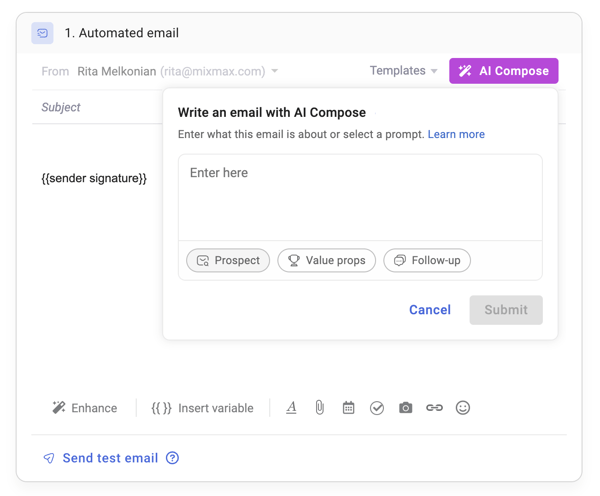Given the competitive market we currently have, it's absolutely crucial to deliver an exceptional customer experience. In the Zendesk Customer Experience Trends Report, a striking 75 percent of consumers express a readiness to allocate more of their budget towards businesses that deliver exceptional experiences.
The good news is that artificial intelligence (AI) has completely changed the way we manage customer experiences, equipping businesses with powerful tools to boost customer satisfaction and foster loyalty.
In fact, it's essential for your business to stand out among the crowd, so go the extra step to give your customers a great and lasting impression.
In this post, we're going to talk about gaining insightful customer behavior data, streamlining sales processes with automation, and more.
Along the way, we'll highlight the perks of embracing sales AI, and discuss the key performance indicators (KPIs) that truly matter for success.
Significance of customer experience in modern business
Customer experience is a real game-changer. It's the secret sauce that can set your company apart from your competitors. Nowadays, customers have come to expect nothing less than seamless experiences that address their unique needs and preferences.
Below are a few key examples to underline just how crucial this is:
- Customer loyalty and repeat business: Exceptional service builds customer loyalty, ensuring customers always come back for repeat business!
- Positive reviews and Word of Mouth: Customers who have great experiences become your brand advocates.
- Revenue growth: Positive experiences mean increased customer consumption!
- Cost savings: Enhanced and personalized service can reduce support costs.
- Market differentiation: In saturated markets, great experience sets companies apart.
- Data-driven insights: More valuable data is gained for businesses to use.
Understanding sales AI
Dialpad’s AI at work report found that the majority of sales and customer service professionals who use AI tools in their workplace have reported a favorable influence on their job performance, with 79% experiencing positive outcomes.
With that said, this technology really taps into almost every aspect of business processes such as automation, integrations, analytics, and other data-driven techniques that improve business performance.
In this context, let’s take a look at sales AI. How does it differ from traditional sales approaches?
Unlike the sales processes that we’re used to, some sales AI tools require almost minimal sales rep involvement aside from the initial setup. It gives advanced insights, accurate forecasting, and predictions based on the customer data that you already have.
With the help of this type of tool, sales reps can now easily create their sales scripts and pitches based on customer behavior analysis data. Included in this is the sales playbook that's also a useful tool for agents when prospecting and closing deals.
It all boils down to establishing a strong foundation for customer experience management using sales AI.
As a pivotal component of AI-driven customer experience management, it brings many benefits:
- It automates mundane tasks
- Generates high-quality leads
- Enables personalized sales pitches
- Facilitates precise audience segmentation
- Offers actionable insights
- Supports sales coaching.
It also enhances customer interactions through chatbots and virtual assistants, making interactions smoother and more efficient.
The power of sales AI lies in its ability to analyze customer insights, delivering tailor-made recommendations and identifying emerging market trends.
By crafting highly personalized marketing campaigns and streamlining lead generation and qualification, sales AI empowers businesses to thrive in the ever-evolving landscape of customer experience management.
Related post: Top 10 AI Tools for Sales (Free and Paid) |
Benefits of implementing sales AI in customer experience management
The great thing about AI is that it can speed up internal processes such as follow-ups, data entry, and customer interactions. With that said, agents are more focused on important tasks such as attending to customer inquiries.
Here's an overview of the key benefits:
1. Automated sales activities: There's a long list of tedious tasks within the sales process that sales reps need to do such as taking notes during or after a call. With sales automation, it is now possible for agents to automatically receive a call summary with key points discussed as well as action items.
2. High-quality leads: Agents can easily focus on generating and engaging leads by reaching out to the right target customers.
3. Personalized sales pitches: AI powers the creation of tailored content for individual customers. Responses can now be personalized in real-time and at scale to steer the conversation. Of course, this results in more engaging and relevant conversations.
4. Precise audience segmentation: Data-driven insights can supercharge your marketing efforts by identifying the right people who want to test your product.
5. Actionable sales insights: Sales automation offers valuable insights into successful customer engagement strategies, enabling data-driven decision-making and the refinement of strategies.
6. Sales coaching: Sales AI can assist in sales coaching by analyzing sales interactions and providing feedback and recommendations to sales reps, fostering skill development, and improving customer feedback and interactions.
Dialpad’s Real-Time Assist (RTA) card is an example of how agents can be guided through conversations with customers. It can be triggered automatically when certain words are spoken. Thanks to RTA, agents can now deliver a more personalized response to customers' inquiries more quickly and accurately.
We can see that AI is continuing to shape the customer experience. The mentioned key benefits of implementing sales AI are just examples of how it can further elevate customer experience management. These benefits promise to enhance customer service, personalize interactions, and enable businesses to stay one step ahead by predicting customer behavior.
How to leverage sales AI for customer insights
One of the advantages of AI is that it helps your business give your customers what they actually need. These data-driven insights help you identify customer patterns such as buying behavior and preferences.
With this data, you can segment your customers more effectively. This will then enable you to focus on creating hyper-targeted campaigns that can result in closing deals.
Provide tailored recommendations
Picture yourself shopping online at a platform like Amazon, where AI works behind the scenes to make your shopping experience all about you. It keeps tabs on your every move, from what you search for to what you peek at and even what you drop into your cart or save for later.
But it doesn't stop there — it dives into your buying history, learning the kinds of products you favor, the brands you trust, and your usual spending range. Then, it goes a step further by matching your shopping style with similar shoppers.
Identify market trends
AI can be a real trend-spotter, thanks to customer insights. Let's use a fashion store as our example. They've got AI working behind the scenes, keeping an eye on what people are up to on social media platforms like Instagram, Twitter, and Pinterest—especially when it comes to fashion.
So, here's how it goes down: AI collects all sorts of social media data, from posts to likes and comments, all about fashion. It's even savvy enough to figure out how people feel about different trends using sentiment analysis. Say, it might notice everyone raving about a particular style of shoes, with heaps of positive comments and likes.
And here's the cool part: as new data keeps rolling in, the AI doesn't blink. It keeps updating its analysis, staying on top of the latest trends in real time. All this helps the fashion store stay ahead of the game, adjusting what they offer and how they market it to match the hottest trends in the market.
Optimize marketing campaigns
AI-driven insights can give businesses the ability to craft highly personalized marketing campaigns. When you have a deep understanding of customer segments, their behaviors, and interests, you can develop campaigns that truly resonate with your market.
The level of personalization with AI results in increased engagement, improved conversion rates, and enhanced customer loyalty, creating a win-win situation for both your business and customers.
Automating sales processes with AI
Streamline lead generation and qualification
Sales AI is a great tool for making lead generation and qualification way smoother. It uses algorithms to sift through customer info and spot potential leads more accurately and quickly than manually qualifying leads.
Plus, it keeps an eye on how customers behave and gives sales teams instant insights into what they need, so they can customize their approach for each prospect.
Best part?
It cuts down big time on manual tasks like digging up info on prospects, sorting through leads, or crafting specialized campaigns.
Draft personalized sales emails with Mixmax AI
Another game-changing sales AI tool is Mixmax’s AI Compose feature. Think of it as your personal email drafting assistant that crafts engaging and personalized sales emails in a flash.
This feature is available to use directly within your sequences. It’ll help you draft email messages to prospects and customers, shorten them, make them sound more professional, and even draft email subject lines.

Mixmax’s AI features are meant to help you save time writing so you can focus on other aspects of your pipeline.
Use chatbots and virtual assistants
Sales AI isn't just about leads — it can also jazz up customer interactions. Take chatbots, for example. These tools chat with customers using language that sounds human, thanks to their NLP system. They understand what customers are asking for and shoot back the perfect responses on the spot.
And then there are AI virtual assistants. They're like AI wizards that listen to what customers say or type and instantly get what they want. So, when a customer has a question or needs something, these virtual helpers swoop in and provide quick answers.
No more manual searching for info each time.
Optimize pricing and promotions
Sales AI analytics go beyond lead generation – they're also handy for fine-tuning pricing strategies.
Imagine you're running an online fashion store. Sales AI digs into your past sales data and spots trends, like which types of clothing sell like hotcakes during certain seasons. Armed with this info, you can adjust your pricing or promotions for specific customer groups.
AI also keeps a watchful eye on how your campaigns are doing in real-time. So, if something's not working as planned, you can tweak your strategy on the spot.
It's all about making pricing decisions based on what's happening in the market and what customers are into, rather than relying on guesswork. And in the long run, that translates to better conversion rates for your business.
Measuring success and trends
Key performance indicators (KPIs) for sales AI implementation
Key Performance Indicators (KPIs) are crucial metrics for evaluating the effectiveness of your implementation. These metrics encompass various aspects, including lead generation rates, customer conversion, customer satisfaction (CSAT) levels, churn reduction, and recommendation accuracy.
Think of these KPIs as the scorecard for your sales AI game.
Then there's the average order value, how much it costs you to acquire new customers, how quickly you close deals, and the return on your marketing investments. By keeping an eye on these KPIs over time, you can see how your sales AI efforts are stacking up and spot areas where you can tweak things for even better results.
Sales AI in customer experience management
Picture this: as technology keeps advancing, businesses are diving headfirst into the world of AI in the workplace and for customer experience. It's like giving your virtual assistants and chatbots a PhD in understanding customers, so they can provide top-notch help all on their own.
But hold on, there's more.
We've got predictive analytics in the mix, powered by machine learning. By crunching data, it helps companies figure out what their customers are likely to do next. So they can serve up personalized deals and experiences that hit the bullseye, making customers happy and boosting sales conversion rates.
Future of AI and customer experience
Today, nailing the customer experience is an absolute necessity. Thanks to artificial intelligence, companies are stepping up their game in customer experience management.
Why does this matter so much? Well, customer experience isn't just a buzzword—it's what keeps your customers coming back, shouting your praises, and ultimately, driving your success.
Sales AI takes care of the heavy lifting, from automating tasks to personalizing sales pitches. It even has the knack for understanding your customers' needs and spotting market trends.
But here's the real kicker: AI isn't stopping there. It's set to shape the future of customer experience with cutting-edge trends like natural language processing and predictive analytics.
AI has also found widespread application in the field of job marketing. These innovations will supercharge customer support, take personalization to new heights, and give businesses the power to predict customer behavior.
In conclusion, sales AI is a strategic advantage that can revolutionize customer experience management. By embracing these AI-powered solutions, businesses can create more satisfied customers, boost conversion rates, and secure their place at the forefront of a rapidly changing market.
The future of customer experience management is here, and it's driven by the power of AI.










